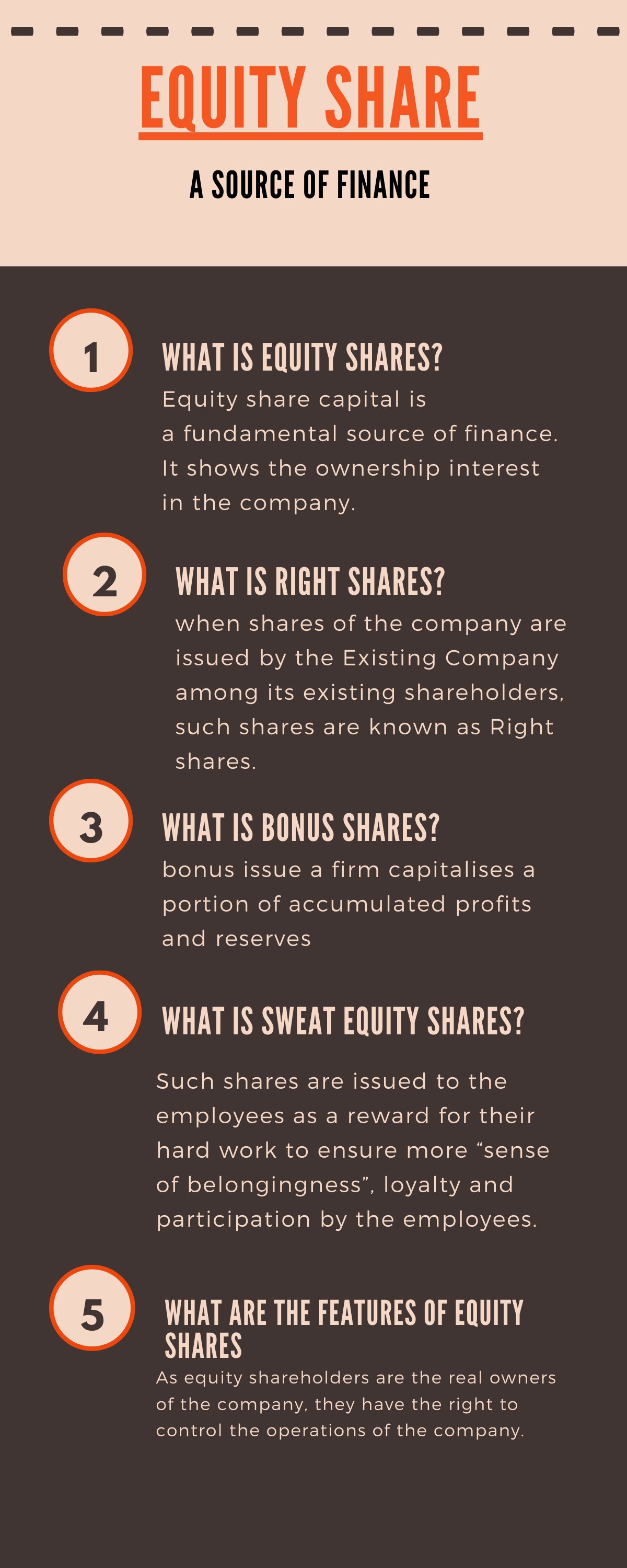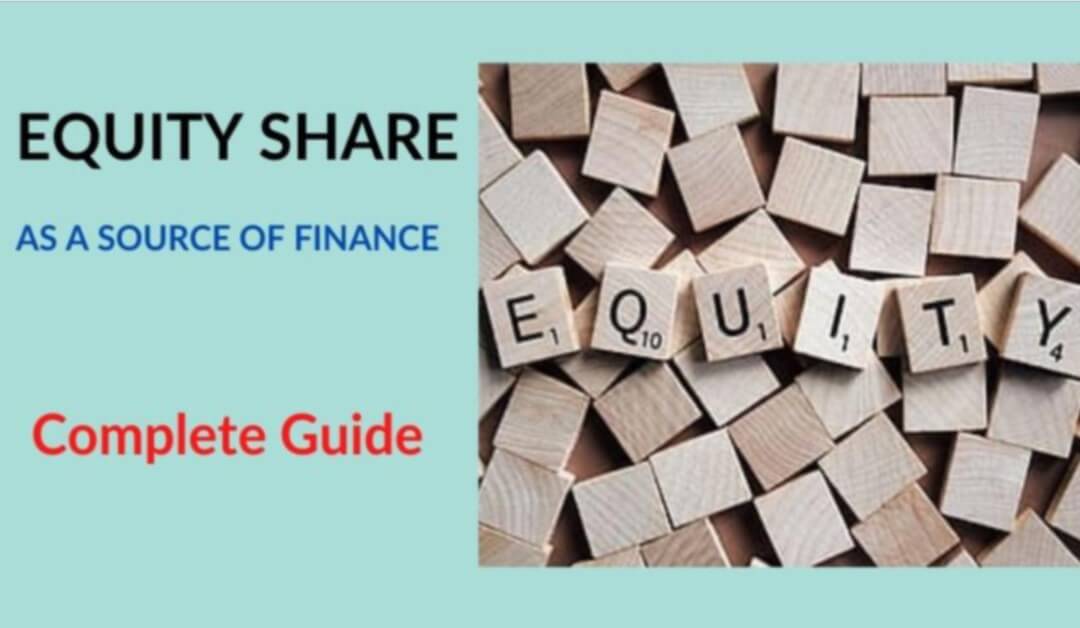Do you know what is Equity shares?
By the end of this article, you would be able to understand Equity shares with its features, advantages, disadvantages, bonus shares, right shares, and many more.
Equity share capital is a fundamental source of finance. It shows the ownership interest in the company.

what we are going to learn today:
- What is Equity Shares?
- How much amount of equity finance is required to raise?
- Right Shares.
- What are Bonus Shares and what are the different sources of issuing it?
- Sweat Equity Shares and what are the conditions of Issuing it?
- Features of Equity Shares.
- Why you should take finance from equity shares?
- Why you should not take finance from equity shares?
- Examples of IPOs
- Conclusion
- Frequently Asked Questions (FAQs)
What is Equity Shares?
Equity shares are also known as Ordinary shares or Common shares. It represents the Ownership position in a company. The holder of such shares are called shareholders or stockholders who are real as well as the legal owner of a company.
In other words, Equity shareholders have a residual claim on the assets of the company in the event of liquidation and they get back their capital after the claims of the creditors and Preference Shareholders have been met.
Equity share capital does not involve any mandatory payments to shareholders.
Most importantly,It is a permanent form of finance and it is not repayable during the lifetime of the company.
In short, Equity shares do not have any maturity date.
It also works as a base for creating the Loan and Debt capacity.

In other words, they have control over the working of the company and have voting rights at the general meeting of the company.
However, raising of capital by issue of fresh equity shares is the costliest source of capital mainly because the dividend is paid out of profit after tax.
Moreover, they carry the maximum risk than that of Preference and Debt capital which have also an impact on the cost of capital.
How much amount of equity finance is required to raise?
Let me tell you, this question depends on Debt-Equity Mix or Debt to Equity Ratio of your business, you can analyze it on yourself by using this formula—
Debt toEquity Ratio— Long-term Loans /Proprietor’s Fund
- Long-term Loans—Debentures, mortgage loans, bank loans, or any other long term loan.
- Proprietor’s Fund—It means Equity share capital, Preference Share capital, securities premium, general reserve, capital reserve, any other reserve, and credit balance of profit and loss account.
Significance: – this ratio is computed to assess the liability of your business to meet the long term loans.
Generally, the Debt-equity ratio is 2:1, is considered as safe, it means for at every 2 rupees debt capital there should be at least 1 rupee owner’s capital in the business.
If the actual ratio is more than 2:1, it indicates a risky financial position of the business. If the actual ratio is less than 2:1, it indicates the sufficient protection to Lenders.
Rising of equity capital made directly from the public by issue of fresh equity shares or through right issue or issue of bonus shares or through the issue of sweat equity shares, Let me Explains this to you one by one—
Right Shares
when shares of the company are issued by the Existing Company among its existing shareholders, such shares are known as Right shares.
For example, 1 Right share is issued for every 4 Equity shares held by each equity shareholder.
In addition, you may purchase their shares or may sell the “Rights” through a broker within the specific period of the offer as stated by the firm.
Right shares are issued to safeguard the interest of equity shareholders and enable them to maintain their proportional ownership.
Most importantly, The issue price is generally lesser than the market price of such shares.
In short, The cost of issuing the right shares is lower than that of the cost of public issues.

Bonus Shares
The issue of bonus share is not in fact an issue of shares to raise further capital. Through bonus issues, a firm capitalizes a portion of accumulated profits and reserves.
So, it involves the transfer of money from reserves and surplus to equity share capital.
In addition, bonus Shares are issued to the existing shareholders by the existing company without any consideration, i.e., free of cost.
Let me show you the different sources below from where you can issue bonus shares—
- Accumulated Profits
- General Reserves
- Capital Redemption Reserve
- Security Premium
- Capital Reserve
The total amount of bonus shares issued out of free reserves shall not exceed the total amount of paid-up capital. These shares cannot be issued in lieu of cash dividend.
Sweat Equity Shares
Equity shares issued by a company to its employees or directors at a reduction or for consideration aside from cash for providing know-how or making available rights.
for instance, intellectual property rights, patents, or copyright and value additions are called Sweat Equity Shares.
In other words, such shares are issued to the employees as a reward for their hard work to make them happy and to ensure more “sense of belongingness”, loyalty and participation by the employees.
A company may issue Sweat Equity Shares subject to certain conditions, viz.—
- Such shares must be a class of shares already issued by the company.
- Such shares can be issued at least one year after the commencement of the business.
- The company whose equity shares are listed on a stock exchange can issue Sweat Equity Share according to the SEBI regulations.
- on the other hand, whose equity shares are not listed on the stock exchange, can issue Sweat Equity Shares as per the guidelines of the central government.
- A subsidiary of an Indian company can issue such shares to Indian employees even if the subsidiary company is incorporated outside India.
- Limitations, Restrictions, and Provisions relating to equity shares are all applicable to Sweat Equity Shares.

Features of Equity Shares
- The issue of equity shares made according to the Companies Act and SEBI guidelines.
- The equity shareholders have a residual claim on the income of the company. Therefore, The earnings of a company after deduction of interest, tax and preference dividend are the earnings of the equity shareholders.
- The claim of the equity shareholders on the assets of the company is also residual and is relevant only when the firm is being liquidated.
- Similarly, as equity shareholders are the real owners of the company, they have the right to control the operations of the company.
- certainly, Ordinary shareholders may have an opportunity to gain capital appreciation of shares.
- To sum up, the Differential rule exists regarding tax on dividends for the company which declares dividends for the recipient.
Why you should take finance from equity shares?
If you have a company or business:
Equity share is available for use as long as the company is going concern.
It does not involve any compulsory payments to shareholders. Dividend is payable only if there remains a surplus profit after the payment of tax and preference dividend.
In other words, Equity share capital do not carry any charge against the assets of the company.
Similarly, it enhances the borrowing power of the company. Equity shares have no charge on the assets of the company.
In addition, The new equity share capital increases the corporate flexibility for the point of view of capital structure planning.
Above all, Controlling power remains in the hands of the equity shareholders.

If you are a shareholder:
- you are the true owner of the company.
- You have indirect control over the affairs of the company.
- Equity shares get the benefit of acquiring high- prices shares without any consideration as a bonus share.
- meanwhile, your Liability is limited to the face value of equity shares held by you.
- you can also enjoy the benefit of non-taxable dividends as the dividend received is fully tax- free income.
- Above all, whenever you need money, you can dispose of the shares in the stock market which increases your liquidity position.
- You have the voting rights in the meeting of the company.
- Most importantly, as equity shares have high marketability, you always have an opportunity of earning capital gain transferring their shares at high market prices.

Why you should not take finance from equity shares?
If you have a company or business:
- A new company having no reputation in the market may find it difficult to raise funds through equity financing since equity shares do not attract passive investors who always prefer to have a steady income and the safety of their investments.
- The Cost of equity shares issue which contain underwriting commission, brokerage, and other issue expenses, In short, Cost of issuing it is the highest of all sources.
- When you pay dividends to Equity shareholders, the dividend has a burden of corporate dividend tax on the company.
- Further, As Equity capital is a permanent source of finance, it provides no flexibility in the capital structure.
- Above all, Excess reliance on financing through equity shares reduces the capacity of the company to trade on equity.
If you are a shareholder:
- Firstly,the New issue of equity capital may reduce the earnings per share.
- Secondly, As the rate of return to equity shareholders depends on the amount of profit, there is no certainty of their income.
- In addition, Equity investment is a risky investment. Equity stock prices tend to fluctuate widely which makes equity investments risky.
- Most importantly, you are the last claimants on the assets of the company, you may not get anything in the event of winding up.
Examples :
For instance, You can raise equity finance by selling equity shares to your friends and family, investors, or an initial public offering (IPO). Some IPO has listed here:
| Issuer Company | Issue Open | Issue Size (Crore Rs.) |
| IndiaMART InterMESH Limited IPO | Jun 24,2019 | 475.59 |
| Affle (India) Limited IPO | Jul 29, 2019 | 459.00 |
| Spandana Sphoorty Financial Ltd IPO | Aug 5, 2019 | 1,202.34 |
| Sterling and Wilson Solar Ltd IPO | Aug 6, 2019 | 3,145.16 |
Conclusion
Equity share capital is the long term source of finance. it is the costliest source of capital because the dividend is paid out of profit after tax.
To sum up, as equity shareholders are the real owners of the company, they have the right to control the operations of the company.
I explained all sources of Equity finance with the recent IPOs list and also told you the pros and cons of raising finance from equity shares.
So, guys, I hope I solved your problems regarding Equity finance.
Also read my further blogs related to finance:
SOURCE OF FINANCE FROM PREFERENCE SHARES
Frequently Asked Questions (FAQs)
A. Yes, it is a permanent source of funds because it is the owner’s fund.
A. A company can issue sweat equity shares to its employees for consideration other than cash to ensure their loyalty and participation.
A. Equity shareholders are also known as owners of residue because they get paid after all other stakeholders’ claims on the company’s income and assets have been settled.
Blogger | content writer | Learner.
A commerce student from Kolkata.
